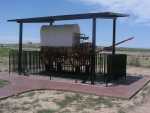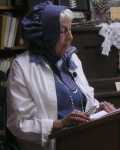Covered wagon display on trail recalls pioneer hardships

Esther Z. Fisher, a local advocate for women's history, served as special guest for a ribbon-cutting ceremony for the Oregon Trail covered wagon display near the city's walking path at the end of Greystone Loop last Thursday.
The presentation was hosted by the Mountain Home Historical Museum, and served to honor the pioneer women of Elmore County.
At the ribbon cutting, Mountain Home Mayor Tom Rist spoke in recognition of several individuals, including Fisher, who contributed their vision and funds to build the covered wagon display. Included in his recognition was Jerry Anderson, who developed the display, and JC Cantrell, who worked to restore and rebuild the wagon.

"This wagon, so visible from the freeway, is a testimony to the difference a few individuals can make," said Rist.
Following his speech, Rist presented to Fisher the commemorative stone that will be placed on the covered wagon. The stone reads: "FRONTIER PARK--Dedicated to the hopes and aspirations of the Pioneer Women of Elmore County. With appreciation to Esther Z. Fisher and volunteers and friends of the museum."
Immediately following the ribbon cutting ceremony, the Mountain Home Historical Museum hosted a community gathering with Rist introducing Fisher as the guest speaker.
During the gathering, free homemade pie was offered to introduce the museum's annual Pie Social on Tuesday, Aug. 18.
"We owe a tremendous debt of gratitude to Esther Fisher, for her determination and for seeing to it that the women of this county, and their accomplishments, are properly recognized," the mayor said.
"We can only hope that when little girls see this wagon, and read the dedication stone, they will stop a moment to realize all the women who overcame incredible odds to do something meaningful and they will be inspired to do something likewise."
Fisher opened her speech by thanking the residents for coming out to remember the pioneer families that walked across this land from the eastern shores to settle in the west.
Fisher recalled a time for pioneer women when there was no electricity, no telephones, no radios, no televisions and no refrigerators.
"Many people today do not realize what pioneer women went through in their daily life. These ladies were tough--they had to be or they could not have survived."
Fisher spoke about life as a pioneer woman, and the differences between pioneer life and modern day life.
Pioneer women could purchase rice, flour and beans by bulk, but had to make bread, butter, salad dressing or mayonnaise.
The pioneers maintained large vegetable gardens and hunted or raised their own meat such as chicken, pork, beef or lamb. "Keeping it so it was edible and didn't spoil was a big undertaking," said Fisher.
Fisher spoke on how the pioneers also dealt with a lack of such things as hot or cold running water, refrigerators, dryers, furnaces or air conditioning.
Without dryers, clothes were washed on "washboards" and ironed using "sad" irons that were heated on a wood stove.
Fisher noted that the society of today has improved and become more automated, but even now people struggle to find work and the economy is in a decline.
"I'm sure our pioneer forefathers are laughing at us as we struggle forward in our automated, electronic super highway world."
Before closing her speech, Fisher talked about how women made a statement back in 1921, when they fought for the right to vote. Fisher has served as a registrar since 1982 and continues to participate in helping people exercise their right to vote.
Fisher closed her speech by reading excerpts from a tribute to the women of the West entitled: "Our Foremothers, Our Sisters and Our Wives," written by John Haily.
"He (Haily) knows from personal experience what men and women braved and endured to make possible the present conditions in this beautiful, prosperous and progressive state."
Following Fisher's speech, Museum director Nancy Marshall recognized Cantrell in the audience.
"I appreciate the gratitude you have for the wagon," Cantrell said. "For not being much of a speaker, I just want to say that without women, it would be a really hard world to live in."
As the event concluded, the guests were welcomed to take home pieces of pie and took time to meet and shake hands with Fisher.
"I'm pleased with the turnout and I'm glad that we can all come together and give the pioneers the respect they deserve," said Fisher.
